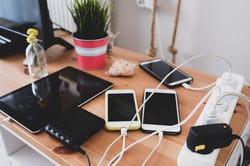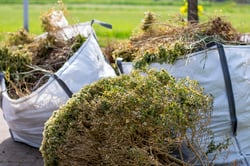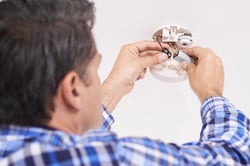
Summer is here – and for many that means long-awaited vacation time and getaways to the beach, mountains or elsewhere.
The last thing you need while on a trip is something disastrous happening to your home, including a fire. With some simple steps taken before you leave, you can help protect your property from fire emergencies, even if you’re thousands of miles away.
Unplug your electronics
 One easy thing you can do? Unplug your major electronics before you head out on your trip.
One easy thing you can do? Unplug your major electronics before you head out on your trip.
The National Fire Prevention Association (NFPA) found that electrical fires account for about 13% of home structure fires. To help mitigate this risk while you’re away, take the time to unplug televisions, computers, chargers, coffee makers, and other electronics before you leave. While you’re doing this, take a minute to check your outlets and cords for any signs of wear and tear. If you find any, you’ll need to replace the cord or make a note to call an electrician before using that outlet or cord again.
This can help lower the risk of an electrical fire while also lowering your electrical bill – a win-win.
If you want to take it a step further, you can purchase technology that plugs into an outlet to help detect electrical fires by noticing unusual arcs in electricity. These often connect to an app, meaning you can monitor for issues wherever you are.
Maintain the outside of your home
 Before you leave for your trip, you’ll probably want to give your lawn a final trim or prune your trees and bushes, since it may be a week or two before you can tend to them again. But in the summer especially, yard debris can pose a huge fire risk.
Before you leave for your trip, you’ll probably want to give your lawn a final trim or prune your trees and bushes, since it may be a week or two before you can tend to them again. But in the summer especially, yard debris can pose a huge fire risk.
You do not want to store any lawn clippings, sticks or firewood near your home, as they can easily start a fire. These materials should be kept at least 50 feet away from the exterior of your home and, ideally, disposed of properly.
It can be tricky to get rid of yard waste since many standard trash companies will no longer take it. Luckily, the NFPA has a blog with many ideas for what to do with the yard waste that can accumulate during the summer.
Check your furnace, air conditioner and smoke detectors
 Make sure your pre-vacation checklist includes doing a quick inspection of the furnace, air conditioner and smoke detectors throughout your home.
Make sure your pre-vacation checklist includes doing a quick inspection of the furnace, air conditioner and smoke detectors throughout your home.
When you look at your furnace, check for any soot or discoloration on the walls and ceiling. If you see any, you need to hire a professional to come inspect it. Inspect the fuel line on a gas furnace to make sure everything is connected and clean of debris. Take a look at your furnace filter and replace it if it’s full, replacing it a minimum of once every 90 days. Finally, look at the area around the furnace – no flammable objects should be in the same space, including paper, paint, trash or anything else.
Of course in the summer, your air conditioner is more likely to be on than your furnace – and high temperatures can cause an air conditioner to work extra hard, posing a fire risk. Before your trip, check that your air conditioner is free of debris, has a clean filter, and that the battery is performing as expected. When in doubt, have it checked out. Better yet, plan your annual HVAC maintenance check to occur right before your planned vacation if possible.
Once you’ve checked your furnace and air conditioning unit, do a quick check on your smoke detectors. These should be tested once a month anyway but check them again to be certain that they’re working, so that neighbors or passersby might hear them if there is an issue.
Make it look like you're home
One final thing you can do to protect your home while you’re on vacation - is make it look like you’re not on vacation at all. This can help prevent making your house a target for suspicious fires or even burglary.
Considering putting an indoor light on a timer, so that it turns on and off throughout the day, and enlisting a neighbor or loved one to bring in your mail and packages so they don’t stack up while you’re away. Having someone check your home routinely can also help with fire prevention, as they’ll notice if anything is out of the ordinary.
Vacation should be fun, and you shouldn’t be worrying about your home while you’re away. These simple steps can help prevent fires, keeping your property safe.
